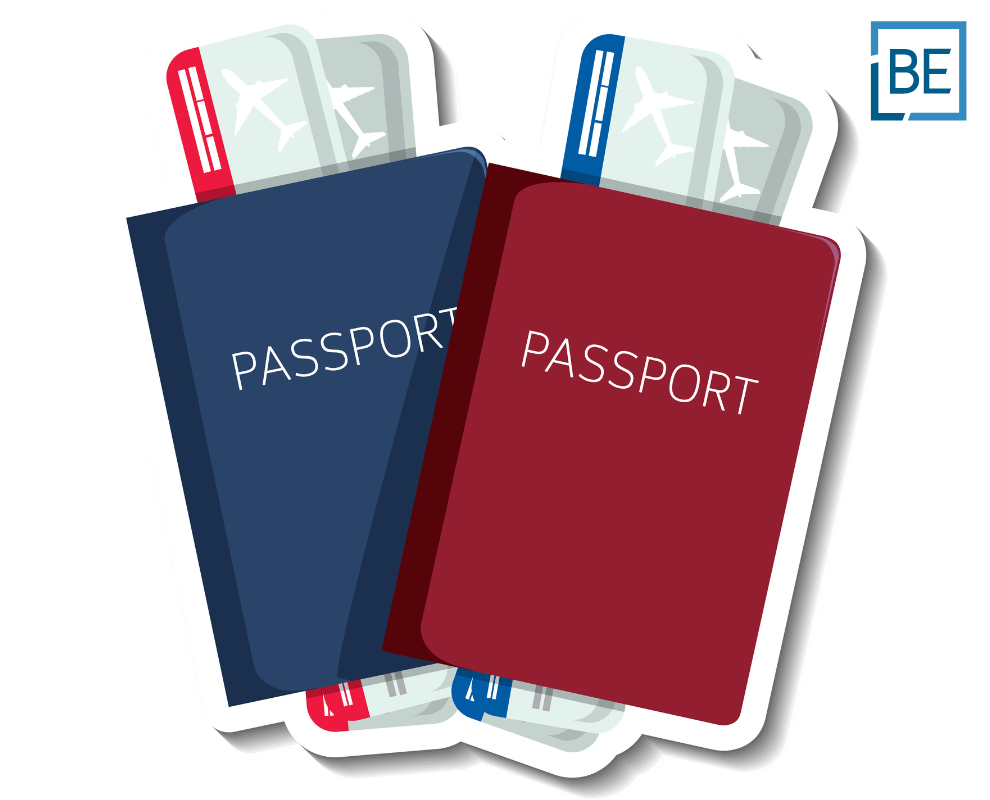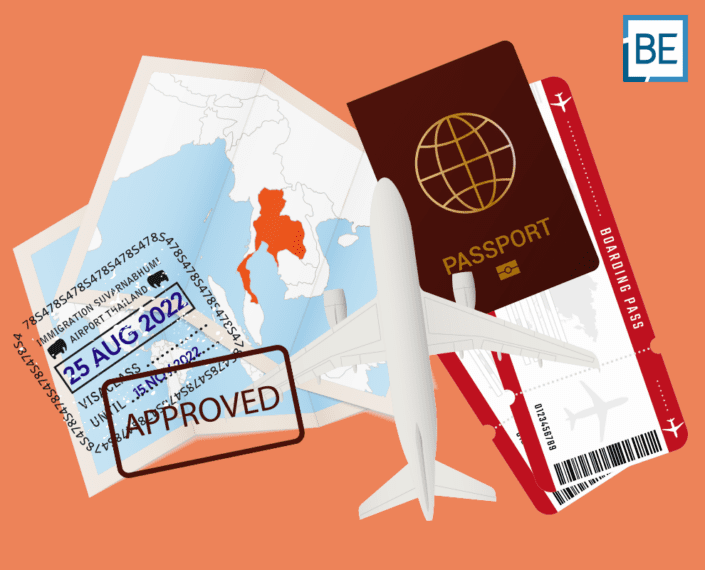Belaws Home ›› Thailand ›› Blog ›› Dual Citizenship in Thailand
visa
Dual Citizenship in Thailand
In today’s globalised world, many individuals have the opportunity to hold dual citizenship, which allows them to enjoy the benefits and privileges of multiple countries. Thai dual citizenship is a serious consideration for those expats who have resided in Thailand for a long time. However, the complicated application process and legal requirements has often resulted in many questions arising from those interested in understanding its legality and practical implications in Thailand.
In this blog post, we will explore the possibility of Thai dual citizenship, exploring its legal framework, eligibility criteria, and the advantages it offers.
Key points
- Thailand allows dual citizenship. Individuals can hold Thai citizenship alongside another nationality acquired through birth, marriage, or naturalization.
- Revocation is rare and applies under specific circumstances like residing outside Thailand for extended periods or engaging in activities against the state.
- Entry and Exit Procedures:
- Entering Thailand: Use the Thai passport to avoid immigration restrictions.
- Exiting Thailand: Use the passport that grants visa-free entry to the destination country.
- Naturalized citizens may need to declare their intent to relinquish their original citizenship, but this might not be legally binding.
What is Dual Citizenship in Thailand?
Dual citizenship, also known as dual nationality, refers to an individual’s status as a citizen of two countries. This means that the person is recognized as a citizen by the governments of both countries and enjoys the rights and privileges associated with citizenship in each.
The rules and regulations regarding dual citizenship vary from country to country, as not all nations allow or recognize it. Some countries allow dual citizenship, while others may restrict or even prohibit it. Individuals may acquire dual citizenship through various means, such as birth, marriage, naturalization, or descent from parents of different nationalities.
It’s important for individuals with dual citizenship to be aware of the laws and obligations of both countries they are citizens of, as each nation may have its own requirements, responsibilities, and potential implications for dual citizens. Travel, taxation, military service, and other legal matters may be affected by dual citizenship, and individuals should seek guidance from legal professionals or government authorities to navigate these complexities.
Does Thailand Allow Dual Citizenship?
Thai dual citizenship has long been a topic of discussion, with varying opinions and contradictory information circulating. Part of this confusion stems from the fact that the laws surrounding dual citizenship have evolved over the years, leading to outdated understandings and misconceptions. To clarify the matter, we need to examine the current legal landscape regarding Thai dual citizenship.
Contrary to popular belief, it has not been illegal for a Thai citizen to hold more than one citizenship since 1992. The Thai Nationality Act underwent revisions, removing the prohibition on dual citizenship. Therefore, Thai citizens are generally allowed to maintain their Thai citizenship even if they acquire another nationality through birth, naturalization, or marriage.
What are the Categories Dual Citizenships?
Thailand offers several routes to dual citizenship including the following:
Dual Nationals with a Thai & Foreign Parent
Many individuals with mixed heritage, commonly known as “Luk Khreung,” fall into this category. If you have a Thai parent and a foreign parent, you are likely to be identified as Luk Khreung in Thailand.
a) Choice of Citizenship at Age 20
There is a common misconception that children with dual citizenship must choose one citizenship at age 20. This misunderstanding stems from outdated legislation that required such a decision. However, the law changed in 1992, and there is no longer a penalty or obligation to renounce other citizenship.
b) Retaining Thai Citizenship
Under the current Thai Nationality Act, a child born to a Thai and foreign parent has the opportunity, between ages 20 and 21, to renounce their Thai citizenship if they wish to retain their other nationality. However, it is important to note that there is no penalty for not making a declaration to renounce.
c) The 2017 Constitution
The 2017 constitution further reinforces the protection of Thai citizenship acquired by birth. Section 39 of the Thai Constitution states that revocation of Thai nationality from someone who is Thai from birth is prohibited. This provision provides additional security for individuals who have acquired both Thai and foreign citizenship from their parents.
Thai Women Taking on Their Spouse’s Nationality
Prior to the 1965 version of the Thai Nationality Act, Thai women who married foreign spouses automatically lost their Thai citizenship. However, this is no longer the case. Thai women who take on the nationality of their foreign spouses can retain their Thai citizenship, provided they follow the necessary procedures.
Dual Citizenship for Naturalized Thai Citizens
For individuals who were not born with Thai nationality, the main route to obtaining Thai citizenship is through naturalization. In most cases, naturalized Thai citizens are allowed to maintain their original citizenship unless their home country prohibits dual citizenship.
When applying for Thai nationality, applicants are required to make a statement of intent to relinquish their original citizenship upon acquiring Thai citizenship. However, it is important to note that this statement is not legally binding, and intentions can change over time. The legal implications of this statement may vary depending on the home government’s policies on dual citizenship and renunciation procedures.
Possible Loss of Thai Nationality as a Dual Citizen
While Thai dual citizenship is generally protected, there are limited circumstances in which dual citizens may lose their Thai nationality. These scenarios include:
a) Individuals born with Thai citizenship due to both foreign national parents being permanent residents may potentially be stripped of Thai nationality if they meet specific conditions outlined in Section 17 of the Nationality Act. These conditions include residing in a foreign country of their parents’ citizenship for more than five years consecutively, actively using or having an interest in a foreign nationality, or engaging in activities prejudicial to the Thai state, national security, or public order.
b) Naturalized citizens may be stripped of Thai citizenship under Section 19 of the Nationality Act if it is discovered that their Thai citizenship was obtained through the concealment of facts or false statements, if they continue to use their former nationality, if they have lived outside of Thailand for more than five years, if they engage in activities prejudicial to the Thai state, national security, or public order, or if they retain the nationality of a state at war with Thailand.
It is important to note that the Council of State maintains records of revocations, mainly for reasons outlined in Section 17 or 19 of the Nationality Act. However, these sections do not apply to individuals born to at least one Thai parent or foreign women married to Thai husbands, as these cases are not considered naturalization under the act.
How do you Travel as a Dual Citizen?
One of the significant advantages of Thai dual citizenship is the ability to travel using two passports. This flexibility allows individuals to optimize their travel experiences, taking advantage of the benefits offered by each passport.
When travelling as a dual citizen, it is essential to follow certain principles to minimize complications and ensure a smooth travel experience.
Travelling in general
Always enter and exit a country on the same passport. This is particularly important in Asia, where immigration officials have strict controls and require consistent documentation. If you enter a country using a particular passport, you should depart using the same passport to maintain accurate immigration records.
Entering Thailand
It is advisable to use your Thai passport when entering Thailand to avoid complications and ensure that you are treated as a Thai citizen for immigration purposes. If you enter Thailand on a non-Thai passport, you will be subject to immigration rules and restrictions, requiring you to apply for extensions of stay, complete 90-day reporting, and pay overstay fines if your stay exceeds the granted time.
Despite misconceptions, dual citizenship is legal in Thailand, and there is no need to be afraid or hesitant about using your Thai passport to enter the country. The 2017 constitution explicitly prohibits the deportation or prohibition of Thai nationals from entering the Kingdom and revoking Thai nationality acquired by birth.
How do you Travel with Two Passports?
Travelling as a dual citizen requires understanding the process of utilizing two passports effectively. Let’s explore an example to illustrate the steps involved in a hypothetical trip between Bangkok and London.
At Check-In:
When checking in for your flight, present both your Thai and UK passports to the airline staff. This ensures that the airline is aware of your right to enter the UK without a visa and issues you a boarding pass accordingly.
At Thai Immigration:
Upon arrival at the Thai immigration checkpoint, you can choose to pass through either the manual desks or e-gates, depending on the available options. Present your boarding pass and Thai passport to the immigration officer for processing.
On Arrival at Destination:
When you arrive in the UK, you can proceed through immigration using your UK passport. Since the UK recognizes dual citizenship, you do not need to present your Thai passport for entry purposes.
For the return journey, follow the same process in reverse. Depart the UK using your UK passport and re-enter Thailand using your Thai passport. This process applies to destinations worldwide, where using a western passport offers advantages over a Thai passport.
How can Belaws help?
For more information about dual citizenship in Thailand, why not talk to one of our experts now?
Please note that this article is for information purposes only and does not constitute legal advice.
Our consultations last for a period of up to 1 hour and are conducted by expert Lawyers who are fluent in English, French and Thai.
Consultations can be hosted via WhatsApp or Video Conferencing software for your convenience. A consultation with one of our legal experts is undoubtedly the best way to get all the information you need and answer any questions you may have about your new business or project.
USD 150
Up to 1 hour
Online payment (Paypal or Credit card)
Legal consultation can be conducted in English, French or Thai
Legal consultations are handled by experienced lawyers from the relevant fields of practice
Frequently asked questions
To address common questions and provide further clarity, we have compiled a list of frequently asked questions regarding Thai dual citizenship and travelling as a dual citizen.
Can Thai immigration officers refuse entry to someone travelling to Thailand for the first time on a fresh Thai passport?
While this has been known to happen in rare cases, it is important to remember that travelling as a dual citizen is not illegal. If you encounter any difficulties, ask to speak to a superior officer who will likely have a better understanding of the rules and resolve the issue.
The Thai constitution explicitly states that no person of Thai nationality shall be deported or prohibited from entering the Kingdom. Revocation of Thai nationality acquired by birth is not permitted.
I entered Thailand on my non-Thai passport. How can I stay long-term?
If you plan to stay in Thailand for less than 30 days, there is no issue. Simply leave Thailand at the end of your stay, using the foreign passport you entered with.
However, please note that while the majority of nationalities enjoy the 30 day visa exemption scheme, certain countries are not eligible and would require a visa issued by a Thai Embassy or Consulate.
If you intend to stay longer and want to avoid overstaying, you cannot switch your entry stamp between your foreign and Thai passports at a local immigration office. Instead, you have two options:
Depart Thailand using your foreign passport and re-enter on your Thai passport. If you have any overstay penalties, you must clear them before boarding your flight. For a quick turnaround, you can fly to a neighbouring country, leave Thailand on your foreign passport, and re-enter on your Thai passport upon returning. This allows for an unrestricted stay.
Extend your stay in Thailand using your foreign passport. According to Section 2.23 of police order 777/2551 (the immigration rules), a person who used to have Thai nationality or whose parent is or was of Thai nationality may be granted permission to stay for up to one year. However, staying in Thailand using this method means you will be subject to immigration rules, including 90-day reporting, extensions, and overstay fines, requiring in-person visits to immigration offices and payment of applicable fees.
Can I swap passports mid-travel, and which method is best?
It is recommended to swap passports mid-air during your journey. Immigration officials at airports do not typically keep track of “stamp trails” in passports, making it a smoother process. However, crossing Thailand’s land borders can be more challenging for dual citizens. Officials at land borders may require proof of exit stamps from Thailand, and some countries, like Malaysia, do not recognize dual nationality. To avoid complications, flying in and out of the country for a passport swap is the path of least resistance and can be cost-effective, especially when using low-cost carriers like AirAsia.
If I travel to a western country using my foreign passport, will Thai immigration question the lack of a visa in my Thai passport?
No, Thai immigration will not question the absence of a visa in your Thai passport. The airline staff is responsible for ensuring that you have the right to enter your destination country visa-free. When checking in, present both passports to the airline check-in desk. They will issue you a boarding pass based on your right to enter the destination country without a visa. Proceed to immigration using your Thai passport and the boarding pass recently issued.
My children have Thai dual citizenship and were born in Thailand. Which passports should they use for travel?
It is advisable for your children to always use their Thai passport to depart from and re-enter Thailand. However, when travelling to destinations where Thai citizens require visas, they can use their foreign passport. It is worth noting that the Thai passport allows visa-free travel to Southeast Asia, Japan, Korea, and Russia, making it convenient to use the Thai passport for travel to these destinations if desired.
Can I solely use my Thai passport for travel instead of both passports?
Travelling solely on your Thai passport is possible in most cases. However, you will be responsible for obtaining the required visa if it is necessary for Thai passport holders. It is essential to be aware that some western countries, like the UK and the US, require their citizens to enter those countries on their respective passports, limiting the use of the Thai passport.
Does Thailand allow dual citizenship?
The law in Thailand allows you to have both Thai citizenship and another citizenship from another country. There’s no rule saying you have to give up your old citizenship to become Thai.
Is there any situation where I might lose my Thai citizenship?
While rare, it is possible to lose your Thai citizenship under specific circumstances. These generally involve formally requesting to renounce your Thai citizenship or engaging in activities deemed detrimental to Thailand’s national security.
I’m a Thai citizen by birth and also hold another passport. Do I need to do anything?
No. You can maintain both citizenships without any legal issues in Thailand.
I’m not a Thai citizen but want to become one. Will I have to give up my current citizenship?
In most cases, no. You won’t be required to renounce your current citizenship to become a Thai citizen. However, it’s advisable to check with your home country’s laws regarding dual citizenship, as some countries might have restrictions.
Related articles
Receive a Free Copy of our Handbook
"(Required)" indicates required fields








